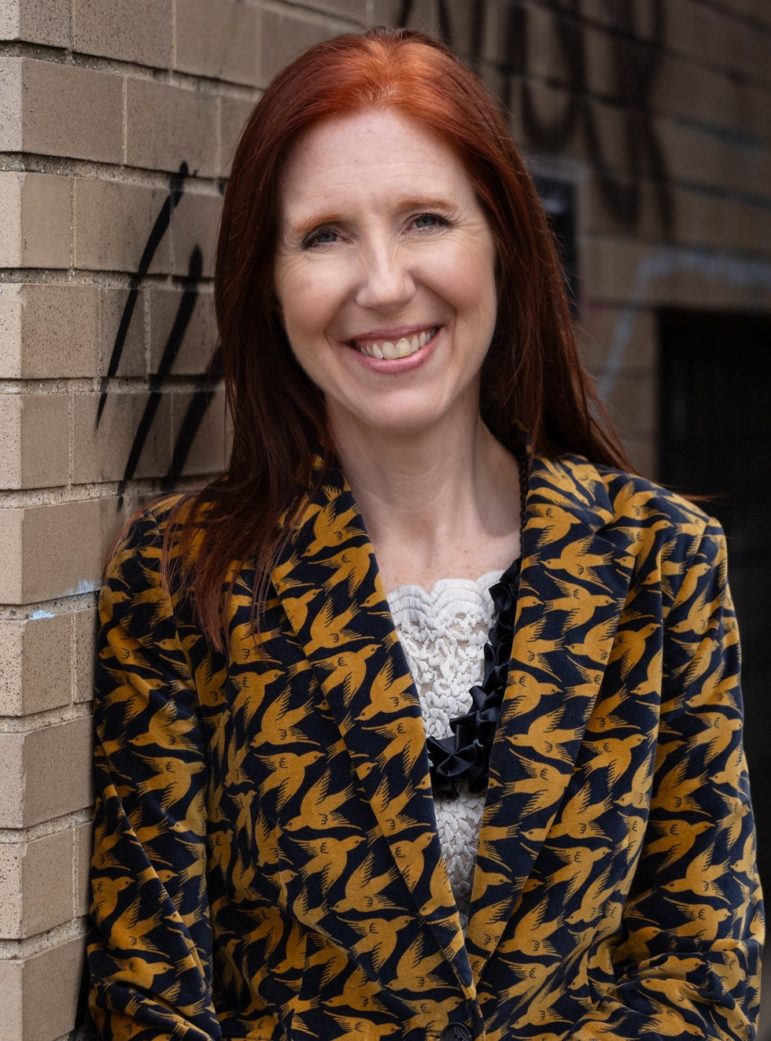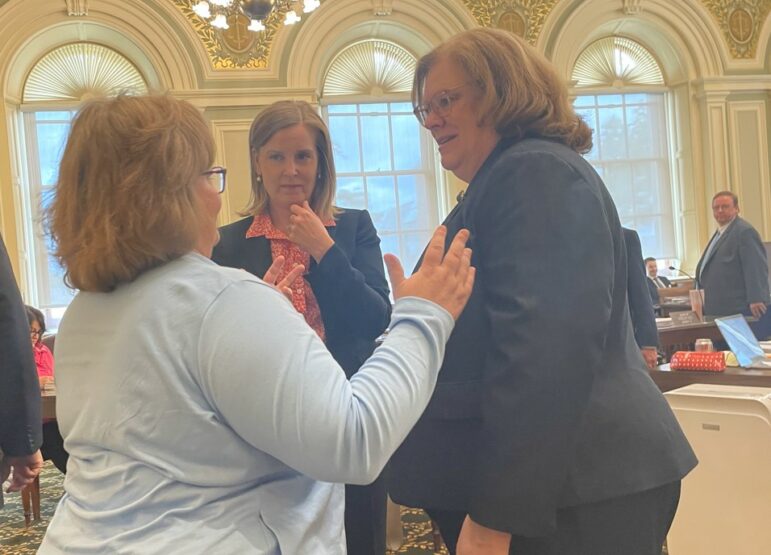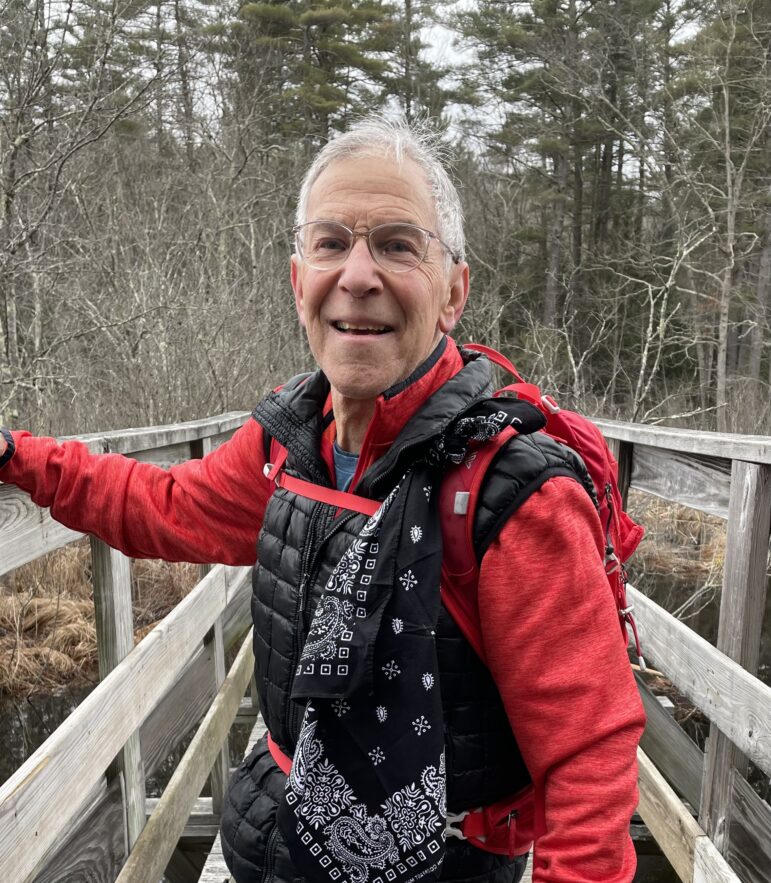By BEVERLY STODDART, A NH Writer’s Life
As New Hampshire Poet Laureate, Alexandria Peary “serves as an ambassador for all poets in New Hampshire and works to heighten the visibility and value of poetry in the state.” I contend she is perfect for the role. Let’s start with, she is funny. I found this as I read her latest book, Battle of Silicon Valley at Daybreak. Her creative mind gives us a poem where emojis are at war and are battling. It is creative and sweeps the reader up into the story of their lives.
Alexandria is a professor at Salem State University, teaching courses in poetry, fiction, creative nonfiction, and mindful writing. She shares with us how she helps undergraduate students grasp how we are intermeshed and how to be comfortable with ourselves and stay in the present moment. Check out her TEDx talk, How Mindfulness Can Transform the Way You Write, on YouTube for a deeper look at the concept.
Frankly, you don’t make money writing and publishing poetry. You do it because you need, love, want, and have to write it. The state chose well when they picked Alexandria for the honored position of poet laureate.
Don’t be afraid. She makes poetry approachable. “Be patient with yourself,” as she urges us to read poetry. I find poetry is a search for those lines you find that you can’t live without. Give her poetry a read. You may find a gem of a line you, too, can’t live without.
I want to start with what poetry is to you.
“Poetry is the language of the internal mind. We think in fragments, and it’s connected to a greater whole. It’s fleeting, a briefer reading experience than prose. For some, it’s almost a form of religion.”
You are the poet laureate for New Hampshire. Would you tell us what that means?
“It’s a tremendous opportunity. In academia, service-learning is a teaching practice in which students exit the classroom and do work in the world, community work. As a professor who is a first-generation college grad, I sometimes find conventional academia to be rarefied and disconnected from people. My dissertation was on Peter Elbow’s Writing Without Teachers and focused on the “extracurriculum of composition,” or writing experiences larger than a classroom, a semester, or a grade. I want to support other people’s writing because my father didn’t have a chance at a college education, likely because of an undiagnosed learning difference. As an immigrant from a country recovering from war, my mother didn’t even have the chance to graduate from high school. So as a mindful writing expert and as state poet laureate, I’m active in the community supporting other people and their writing.”
Where are you from?
“Maine, but my mother is German, and my father was American. It pained me to see people who couldn’t have confidence in their self-expression, as in my mother’s case, to express or get a formal education to express artistically. She is a still-life painter. I’m in love with writing. I’m in love with my writing. I’m in love with your writing. The reason why is that I just feel writing is such an important component of life. One doesn’t need to be a poet professionally. It’s important for everyone who wants to write to have confidence, to not lug around a stone backpack of doubt and wishing to write all their lives. As the poet laureate, I focus on the whole writing process, from writer’s block to helping people start to building opportunities to publish and enjoy a public presentation for their work. I love this community service aspect.”
It’s a great position in the state that is so recognized. I’m thrilled for you.
“I think New Hampshire residents are extremely blessed for a state with a relatively low population, more trees, and streams than traffic lights and sidewalks. Every week, every day practically, so much is scheduled in the state in terms of writing workshops, groups, readings, and celebrations. During the pandemic, all sorts of opportunities blossomed thanks to the miracle people-connector of Zoom. We’ve been able to hold readings and events in the North Country without driving three hours, for instance. Truly in this state, we could benefit from an index of all the available writing events because the Granite State is creatively gifted and blessed.”
How do we pull all of that together? I would like to have that on the NH Writers’ Project website.
“That would be a good idea—maybe pull it off through an email chain or Twitter feed. Have a hashtag. Reach out to people like me, to writers and organizers, and we would each reach out to two other people.”
I listened to Krista Tippett, The On Being Project, and a poet on there said, “a poet trains us to hear what we haven’t heard before.” How should a person listen to a poem?
“Be patient with yourself. Poems are not straightforward prose—it’s more like the language behind the language, sort of indirect or at-a-slant language. It’s almost like hearing someone speaking English when it’s not quite English. I tell my students to trust their instincts. We’re trained to think we’re not good enough as readers or writers of poetry. What’s your emotional, physical, embodied reaction to what we’re about to read? What does it remind you outside of the classroom? Listen to your embodied and personal responses. When I listen to a poem, especially if I’m hearing it and don’t see it on the page, I ask myself afterward what lingers, what persists, what might I remember about this poem twenty minutes from now in my busy life? What’s the poem’s core? Most of all, trust your reactions and responses. Trust you.”
As you say that, I thought of one of your poems. The poem, Sonnet Branches, reads: The forearm of spring rests on the windowsill to the kitchen where I’m boiling opera for pasta.” You’re boiling opera for pasta? What is the meaning of that?
“The gesture behind that line is the blending of the senses, synesthesia. You don’t boil opera: well, maybe sometimes I do… It’s sort of like Miles Davis hearing the color blue. I’m interested in synesthesia because we too frequently relegate experiences to compression categories. There’s much more we know without realizing we know. That line in “Sonnet Branches” sprung from a Japanese novelist named Haruki Murakami. At the beginning of The Wind-Up Bird Chronicle, the protagonist is making pasta and listening to classical music when a woman he doesn’t know cold call phones him, and further interpersonal and intrapersonal strangeness ensues. I was thinking of Murakami and the mysteriousness that happened after that fictional phone call.”
I was listening to On Being about poems and God. How do poems relate to God or religion to you?
“I’m a mindful practitioner. I guess if I had to say if I worshipped anything, it’s the unconscious paired with the present moment. That pairing opens us to the much vaster forces all around us.”
Is that an inner voice you’re listening to?
“It’s also preverbal and nonverbal. It’s a lot of stuff sensed that’s not language. It can be a voice. From a Buddhist perspective, everything is intertwined. It’s very intertextual, one piece of writing affecting another piece of writing, and everybody is intermeshed.”
“I teach mindful writing at Salem State University in Massachusetts, undergraduate and graduate students. This semester, we were trying to understand Thich Nhat Hanh’s concept of interbeing. It’s so hard for me to help students reach an understanding of interbeing and its related concept of verbal emptiness. The paradox: they’re enrolled in a writing class with a professor telling them to become more comfortable with the nonverbal and not writing. When has a writing teacher ever told them to notice pauses and blanks in their writing experience—to honor not writing? How does that differ from garden variety procrastination? Does it? How does one teach this concept to a bunch of twenty-year-old’s?”
“I said, ‘We’re sitting in our seats in this lecture hall in this moment. Let’s just think about our clothing, the gasoline we used today for our commute to school, the food in our bodies, everything happening right now. What of all that did we originate? Did I originate the gasoline? How long would it take me to make a car? The pen you’re holding, even the paper in your notebook? Think about the hundreds of people who are behind that laptop or your sneakers or the food in your belly, the coffee on your breath. In point of fact, we’re all intermeshed. It’s the same thing with writing and with language: we didn’t invent the language we use. Every moment of writing means interbeing and intertextual, middles, no beginnings or ends, no independent origination or individual, freestanding genius. That’s our consciousness as writers. So, I think that’s my version of religion.”
I don’t think of God when I read poetry. I love the language as it says something to me. It takes me somewhere. What words are important to you?
“Present moment. If I had a tattoo, it’d be the phrase, “Only Connect,” from E.M. Forster, the novelist. Or a mindful writing mantra. My mantra is “Your ability to write is always present,” as well as “Every breath is covered in language.”
Are you saying don’t doubt yourself?
“I’m saying simply notice that you’re doubting. Notice that you’re feeling uncomfortable doubting. Just see it as a fire in front of you. You don’t reject it. Don’t add anything extra onto the moment by judging yourself or the feeling. Instead, it’s “okay, I’m doubting myself right this moment. I’ll just sit with it and watch it as the doubt invariably changes, as everything does fade and change.”
“I tell my students: you’re never anything permanently. You’re never a bad writer or a good writer. If you wait long enough, everything changes. To be plainly spoken, I do wish people would doubt themselves less as writers and readers. I want to promote people’s positive relationship with their language. But more important in the end (even if it’s not always easy on me to carry forth this teaching) is to help people notice, observe, and accept (not reject) even their doubt.”
Should poetry be read aloud or silent?
“It depends. I know that for me, interacting with poetry is silent. Some people favor listening to the sonic qualities of sound.”
What is your style of writing?
“In the past, people responding to my work have called me post-modern, I guess. I think “lively” and “I’m alive.” I think “engaged in the world.” My newest book, The Battle of Silicon Valley at Daybreak, is about our current times: politics and social media abound. Federal judges hide behind houseplants, a sonnet explodes from sexism, statues of penthouse dictators are toppled, and a mountain threatens to drop on top of a hiker as an out-of-touch act of homophobia. I’m happy to include tangible, concrete details in my poetry and some humor. I’ve been told by my husband that in person, I’m a German kind of not-funny, but that’s not the case with my writing.”
Who is your favorite poet?
“If I had to say one person, Emily Dickinson is my favorite.”
I have pictures of her poems on my bedroom wall, along with Mary Oliver.
“I’ll give my students a Dickinson poem without her name. Most won’t recognize the writer. Afterward, they’re deeply surprised. Dickinson is one of the most unflinchingly brutal writers you’ll ever encounter. She’s not little field flowers and songbirds unless the little yellow finch is removing its own heart. This woman was up to something. If I randomly open my elastic-bound collected Dickinson in a moment of bibliomancy, nearly any Dickinson poem I encounter will offer unparalleled meaning in that moment.”
Rhyme or no rhyme?
“I’ve never been a traditional poet, but I did teach a craft of traditional forms class last semester. I told my students that prosody isn’t my forte, and to comfort their own worries about iambic pentameter, I shared how one of my college teachers once said out of frustration that I had a tin ear. I told them that we’ll learn verse forms and meter together. By the end of the semester, I’d found a national undergraduate contest in formal poetry with a $500 first prize and no entry fee. Instead of a final portfolio or exam, why not submit our villanelles, sonnets, sestinas, and ghazal on the last day of class? Students had the option of entering their work in the contest or not (they didn’t have to hit “Submit”). About two months later, I received a text from an excited student from that class: “I’m honorable mention!” A few minutes later, I received a second text message from a second student in that class, so now we had two honorable mentions. I waited, Cheshire cat smiling. A third text message arrived, reading, “OMG! I won first place in that contest!” Needless to say, I was such a proud writing teacher (probably insufferable to my English department colleagues).”
Another poem I pulled was Counterfeit Clarice Last Lispector. “Pearl choker on a possum, suit jacket on a raccoon. A skunk, a lynx, two tubby foxes moonlighting as twin nephews or as young men dated our daughters.” Please tell us about this poem.
“A couple of the poems in Battle of Silicon Valley at Daybreak reference Christ and the Last Supper. Clarice Lispector was a Brazilian fiction writer who wrote one of the most amazing short stories, “The Sharing of Loaves,” about people reluctantly (that’s putting it pleasantly) attending a lunch at someone’s home. The speaker is so bitter: the opening seeps with why-do-I-have-to-be-here attitude until the hostess appears. It’s really last supper-ish. The hostess appears with an abundance of oddly described food, none of which is straightforward food. The pickles have spikes. The grapes are sadomasochists. It’s all kind of odd—nothing exactly edible. By the story’s end, the narrator is redeemed. In the last paragraph, the narrator repents her misdirected bitterness, realizing its true source was her secret sense of inadequacy. In “Counterfeit Clarice Last Lispector,” I’m spoofing off of “The Sharing of Loaves”; the poem is about ingratitude.”
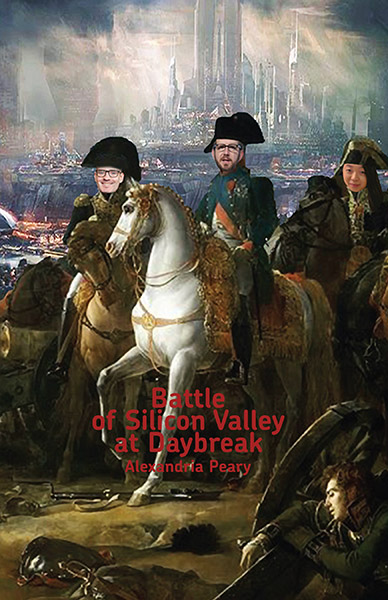
Tell me about the cover of Battle of Silicon Valley at Daybreak. Who is on it and why did you choose it?
“The poem, also called “The Battle of Silicon Valley at Daybreak,” was accepted in an online magazine. After a few months, I checked to see if the poem had been published, searching the poem title in Google, and up pops this image, “The Battle of Silicon Valley” (no time of day), with Jeff Bezos, Mark Zuckerberg, Jack Dorsey, and the other usual suspects on horses, bodies of fallen soldiers, destroyed contemporary cityscape in the backdrop. It was by a student, Jennifer Shon Hill. I contacted her and asked if I could use the image for the book cover.”
The cover makes the book.
“When I saw that somebody else had done a visual version with the same title, hers is Battle of Silicon Valley, and mine has at Daybreak. I think I was referencing a painting of George Washington. I had to have it. I reached out to her.”
Wow, that is kismet.
“Exactly.”
What started the poem? Please describe it.
“It’s a two-page poem with stanzas that I tend to strum like a guitar. Mostly it depicts a narrator looking at an unusual mural outside a cafeteria in a social media company—a Renaissance-style battle scene, except the soldiers, are emojis. They are fighting for net neutrality and against internet regulation. This poem folds in reference in different classical battle texts, Iliad, Homer, and the soldier emojis come from different time periods, including the American Revolutionary War. In one stanza, a goddess falls in love with one of the emojis who works in a cubicle in Silicon Valley. She becomes pregnant to someone half Hollywood, half New Jersey mortal, with a weak ankle. It’s got attributes of Hollywood and also Greco-Roman, but I’m also talking with the awareness that I have never served in the military. I’m somebody who can read a book about the Vietnam War but have not had any personal service. These emoji are the people sent to battle, and they suffer and die, instead of people like me.”
Why emojis?
“It’s based on Giorgio Vasari’s fresco describing the 1554 battle between Florence and Sienna, a horrific rivalry orchestrated by the Medici family. When I saw the wrap-around mural of the battle in Florence, in my mind’s eye, I saw thousands of smiley faces instead of replicated men’s faces.”
I love the line, “Outfitted in a list supplied by Wikipedia (breastplates, gauntlets, steel collars, mail shirts.”
In the second stanza, I say, if an emoji soldier is poor, they can get chain mail made from a 3-d printer. I love to incorporate text from other places, and I’ll change genres in the middle of a poem. I’ll quote Wikipedia. The numbers in that poem I just made up. I wanted to give the sense of thousands of happy emojis, thousands of crying emojis. All the different types.”
And then we have, “a Cubicle Emoji, petitions the Board of Directors to rescue Jim from his jangling fate of war, seduces him, give birth to a daughter, 1/2 Hollywood, 1/2 New Jersey mortal, with a weak ankle…Emoji were at war.” Such a good poem.
“Thank you. That one makes me a little uncomfortable because I realize the gravity of the topic, but it’s also funny. That combination may not sit entirely well with some.”
It ends with, “they have seen how emoji blood sounds like a ring tone of a 50 gun salute in a thousand wavy ploughed lines, lines, lines, lines where truth is marching on.”
What truth?
“I’m rifting off of Julia Ward Howe’s Civil War poem, “The Battle Hymn of the Republic.”
“I tell my students that how you handle your rejection moments will speak volumes about you and your path as a writer. As one of my initiatives as state poet laureate, I started an online teen literary magazine called Under the Madness Magazine with teens from New Hampshire as editors and staff readers. Helping younger writers, including these editors, handle rejection and success is part of the mission of that magazine. By the by, this magazine is open to any teen writing in English in the world. In our first issue, we’ve published several international teens. Our second issue should be out and about in time for the 2022 North Country Writers’ Day on May 6.”
How will it publish?
“It’s all online.”
Tell me about mindfulness.
“I specialize in mindful writing—I have a book on the topic, Prolific Moment: Theory and Practice of Mindfulness for Writing (Routledge 2018) and a 2019 TEDx talk. One of the scariest things I’ve ever done. In the past two or so years, I’ve been giving presentations and workshops on mindful writing, including for the National Council of Teachers of English, NaNoWriMo, NH Humanities, and as a keynote address.”
I have a friend who wants to do that.
“She should just do it. Do it. Do it. Try, try, try, try, try. There’s a great book I checked out at the library on TEDx presentations and how to rhetorically shape them. That was a real valuable resource by the guy who founded TED: Chris Anderson’s TED Talks.”
How did mindfulness start with you?
“It started at the Iowa Writers’ Workshop. I had bad writer’s block for years. I doubted and treated myself very poorly—while persisting, which just gave me more practice doubting and treating myself poorly. Perfectionism. I worked for nine months on a single poem. One poem. Nine months is ridiculous. I’d get up at four in the morning to work on it every day. I was so caught up. I pulled myself up, and then I’d falter. A combination of mindfulness practice and the very premature birth of my first daughter: these two factors came together at the same moment in my mid-thirties. Sophia had to remain by herself in a neonatal care unit in Boston while her father and I were in Milford, NH. It was so sad. The only way I could cope with Sophia’s birth was I would sit at the desk and say, I’m going to write right now, whatever comes to mind. Whatever I’m experiencing now, I’m going to write.” For the first time in my life, I put present awareness beside listening to internal language, and suddenly I was writing.”
“I noticed a high level of acceptance and grace: my entire goal was to accept whatever arose, and I was able to write, and it never stopped afterward. A decade later, I finished Prolific Moment, an academic book making a hard-core scholarly argument why this isn’t touchy-feely. In reality, you only write in the present moment. In traditional writing instruction, we don’t ask students to really engage in the present moment. We never write in the past. You never write in the future. You only write now. Overlooking the real-time actuality of writing—and teaching students to overlook the moment—causes lifelong obstacles. I do believe, though, that the concept of mindful writing is catching on.”
How do you stay in the moment when you are writing?
“One of the best ways is to become embodied: so, watching breathing and watching the physical sensations of now. However, a whole tool kit of writing resources arise from observing the present moment: the first is monkey mind (observing with detachment the ongoing chatter in our heads). We are always off-roading from the present, letting our internal babble abscond with us into daydreaming, fantasizing, and hearing things. Try to stay, stay, stay. By staying, you gain access to your monkey mind, our friend, because it is always supplying us with words, a river of language. You always have something to write if you can remain observant and non-judgmental (detached). On the other hand, the monkey mind is Janus-faced: it whispers messages, not nice ones, about our writing ability.”
“The second tool is the embodiment. You start noticing you get ideas from everywhere. The last one is impermanence. Everything is always fluctuating and changing. That’s cool because nothing is ever static. You’re never one thing. You’re not a bad student or a gifted writer. Things fluctuate. Watch it mindfully. It’s wonderful. Radical impermanence is a blessing for a writer. I also teach verbal emptiness, how to notice blankness, and not to be afraid of it: form is interconnected with formlessness. You start noticing that there are no readers during the real-time of writing: at the moment of writing, you are wonderfully alone. You’re separated in space and time from your future readers.”
“Mindful writing is my life. It’s what I’ll likely continue to support in the community after my poet laureate term ends.”
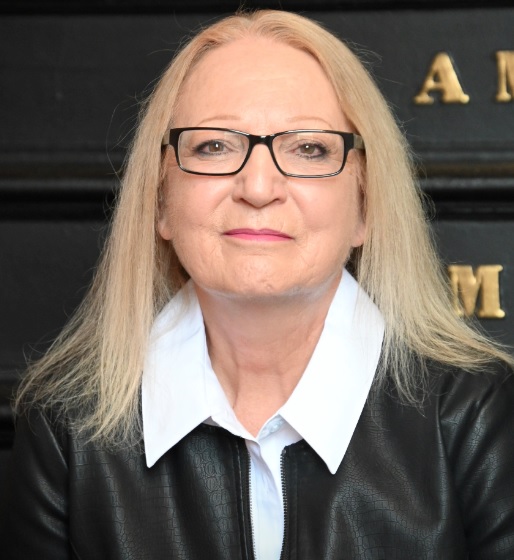
Beverly Stoddart is a writer, author, and speaker. After 42 years of working at newspapers, she retired to write books and a blog. She is on the Board of Trustees of the New Hampshire Writers’ Project and is a member of the Winning Speakers Toastmasters group in Windham and the Ohio Writers’ Association. Her latest book is Stories from the Rolodex, mini-memoirs of journalists from the 1960s, 1970s, and 1980s. A prized accomplishment was winning Carl Kassel’s voice for her voice mail when she won the National Public Radio game, Wait Wait…Don’t Tell Me! She has been married for 45 years to her husband, Michael, and has one son and two rescue dogs.
